DUBAI // Part of Dubai Creek will be made two metres deeper and opened up to hundreds of large dhows and other commercial ships as part of an ambitious Dh200 million development announced yesterday.
The new maritime traffic will anchor at a new three-kilometre wharf between Deira Corniche and Palm Deira, and Business Bay Canal will be connected to the sea in moves aimed at boosting trade and tourism.
"Dubai Creek and dhows are one of the most important part of the economy," Hussain Lootah, Dubai Municipality's director general, said yesterday. "There is an increase in dhows. Some of the dhows have a special technical height and depth and some of them have difficulty in entering the creek. Therefore, we have decided to have more space, more handling areas, more logistics support. It is very important to keep the dhows close to the market."
Work on the Dhow Wharfage Development at Deira Corniche, in front of Hyatt Regency, will begin next month at a cost of Dh200 million. It will accommodate nearly 400 dhows of different sizes berthed at the same time.
The creek will be dredged to seven metres metres from the existing five, and the wharf will have 30 loading and unloading bays. "The creek has some limitations. This wharf will meet the demand," said Mr Lootah.
Ships will be able to enter this section directly from the sea. New quays and administrative buildings will be built and nearly 390,000 cubic metres of sand dredged from the creek bed will be used to reclaim land for the wharf. The development will be ready by the end of next year and will have full fire-fighting equipment to respond quickly to emergencies.
Authorities also promised to revive the stalled Business Bay Canal, which had been initiated by Dubai Holdings. Sea water will be brought from Jumeirah to the Business Bay area with the help of a pumping system. The sea water will be used to flush the four existing lagoons and, ultimately, will be channelled into the creek.
Ibrahim Mohammed Ibrahim Ali Juma, head of the Coastal Engineering Unit, said the water would be brought to the pumping station in Jumeirah Beach Park through a three-kilometre, underground tunnel.
"We will pump water from the sea to the lagoons to improve the water quality of the creek," he said. The micro-tunnelling technique would not cause any obstruction to residents or road services.
The Business Bay Canal project will be completed in two phases. The first part will connect the canal to the sea. The second will connect it to the existing lagoons.
Municipality officials are confident that the estimated Dh200m project will beautify the emirate, increase tourism, and improve water quality. Mr Lootah said he hoped the waterway would eventually be navigable, but he conceded that the massive development was "complicated and challenging".
The authority has conducted a hydrodynamic study on water circulation in the Business Bay Canal and the inner part of Dubai Creek. A consultant team will be hired next week. The project could take over two years to complete.
The municipality also announced yesterday that animals from the overcrowded Dubai Zoo will be moved to a new open safari park within the next two years.
About 400 hectares of land in Al Warqa'a on Aweer Road will be redeveloped to become Dubai Safari. It will include a butterfly and botanical garden, golf courses and other recreational activities.
"The zoo is one of the issues and has been the talk for many years," Mr Lootah said.
Animal rights activists have criticised the zoo for its limited space, shared cages for animals of different species, and poor conditions. Despite the space constraint, Dubai Zoo officials have maintained that the animals are treated with great care.
The safari park will be divided into African, Asian and Arabian villages, with each village accommodating animals from those respective regions.
Dubai Safari will be developed on land that has been previously used to dump building materials. However, only 60 hectares of the Dh150 million park will be set aside for wildlife, comprising animals from the existing Dubai Zoo and new animals, which will be brought from zoos around the world.
"The project will go in different phases," said Mr Lootah. Animals will be brought based on their ability to adapt to the weather.
Mr Lootah said he hoped Dubai Safari would be ready by the end of 2014. Land will levelled, and infrastructure - including recreational facilities - will be set up. Visitors will be able to travel around the 400-hectare area on solar-powered buggies and other vehicles.
pkannan@thenational.ae

Dubai Creek expands in Dh200m plan
Waterway will open up to large commercial ships in boost for both trade and tourism.
Most popular today
